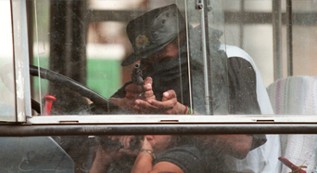|
Josť Padilha is relatively new to the film scene. His only previous work before "Bus 174" was as producer and writer of "The Charcoal People", a Brazillian TV documentary about coal miners in South America. Now Padliha goes much deeper into the core of Brazil's social issues and the root of violence itself with "Bus 174". This film details the events of June 12, 2000, when in Rio de Janeiro, Brazil, a man named Sandro do Nascimento highjacked a bus in one of the city's busiest areas, in front of hoards of news media who broadcast the event live. The brilliantly crafted "Bus 174" went through a highly successful festival run, winning several awards, before landing its theatrical release with Thinkfilm and HBO Cinemax. To learn more, visit the film's official site. It was my pleasure to be able to talk with Jose Padilha about this film.
Evan Spigelman: Can you describe "Bus 174" for those who haven't seen it?
Josť Padilha: "Bus 174" is about the life story of a Rio de Janeiro street kid who became a criminal and ended up surrounded by the police inside a bus he was trying to rob. It is about the reasons why he became a criminal and the reasons why he behaved in such a strange way inside the bus.
ES: How did you decide to make this film?
JP: I decided to make it because the hijack was broadcasted live for the whole country and it deeply affected my perception of the origins of urban violence in developing countries.
ES: In the process of making the film, did anything you uncovered surprise you?
JP: The fact that the regular media, which was all over the bus hijack for more than a week, failed to get very important information about Sandro's background and made many mistakes on informing the public about him. It makes me wonder about the possibility of mistakes in other stories as well.
ES: How difficult was it to obtain information/footage/interviews for the film?
JP: The footage was complicated mainly because of the money and of the fact that big networks, at least in Brazil, do not regularly sell stock footage. The interviews with the hostages were easy to get, but not so with the police officers, who feared being fired for speaking on the film.
ES: Do you think the events that transpired on Bus 174 would have transpired the way they did if it wasn't for news media?
JP: No, I do not. The media was very present there, and it certainly influenced the hijacker and the police behavior. In particular, from what I know of the Brazilian police, Sandro would have been killed instantly if the hijack had not taken place in a fancy area close to big network offices.
ES: Did you face any obstacles or opposition in making or releasing the film? If so, of what kind?
JP: No, I did not because I released the film in film festivals before going commercial. And by the time I did go commercial, the film was already well known and I guess the people who criticized it decided it was not worth going after because it would create to much "noise" in the press.
ES: Will you continue to pursue the theme of the role of the police in the future?
JP: Yes. In fact, I am currently writing a script about it.
ES: Since this film is being released worldwide, are there any concerns about how people may view Brazil after seeing "Bus 174"?
JP: I think the film reflects reality here. So I guess only the people interested in pretending that reality is different from what it is should have concerns about the film. On my end, I think we should be sincere about our country, acknowledge our mistakes and try to improve.

ES: Do you feel it is possible to make an entirely objective documentary, or is one's personal opinion always projected in some fashion onto this kind of film? Do you think "Bus 174" is a completely objective film?
JP: The answer to this question depends on the definition one adopts for the word "objective". I like the definition John Searle gives, which goes like this: something is objective when it can, at least in principle, be perceived by different subjects. As oppose to that, something is subjective when it can only be perceived by a given subject. For instance: I cannot perceive the thoughts you have, so they are subjective. Since we can both perceive the film, on this sense it is objective. The other sense people try to attribute to the word objective is usually confusing and not very useful. For instance, I do not think that subjectivity has any thing to do with the fact that my personal opinion is in the film or not. If it is, then the opinion is now objectified, and that is it.
ES: Have conditions in Brazil changed at all since the making/release of "Bus 174"? Do you percieve that some change may occur because of the film?
JP: No, I think the situation is pretty much the same, if not worse.
ES: Working within the boundaries of releasing this film commercially, was there anything that had to be cut that you wish stayed in the film?
JP: No!
ES: Have the reactions, both in Brazil and abroad, been what you have expected?
JP: To tell you the truth, I never expected the film to have such a great run!
ES: What is your ultimate hope for the film?
JP: I wanted to tell Sandro's story in a way that it would talk about violence in Brazil. That was my goal.
ES: What projects do you think you may want to pursue in the future? Are you at all interested in fictional filmmaking?
JP: Yes, I am. In fact, I am writing a script for a film I want to direct.
ES: Thank you very much!
JP: My pleasure!
|